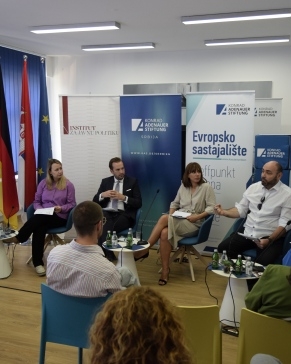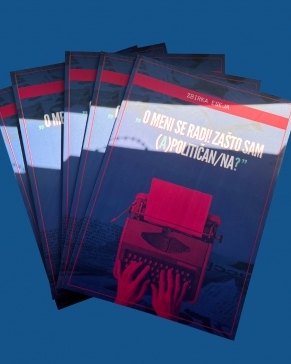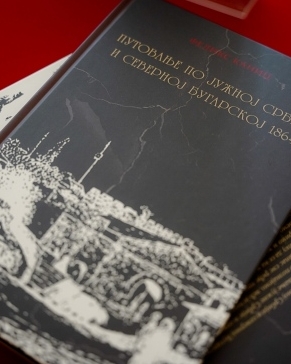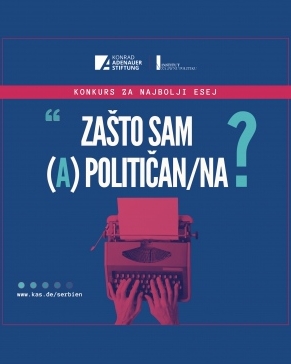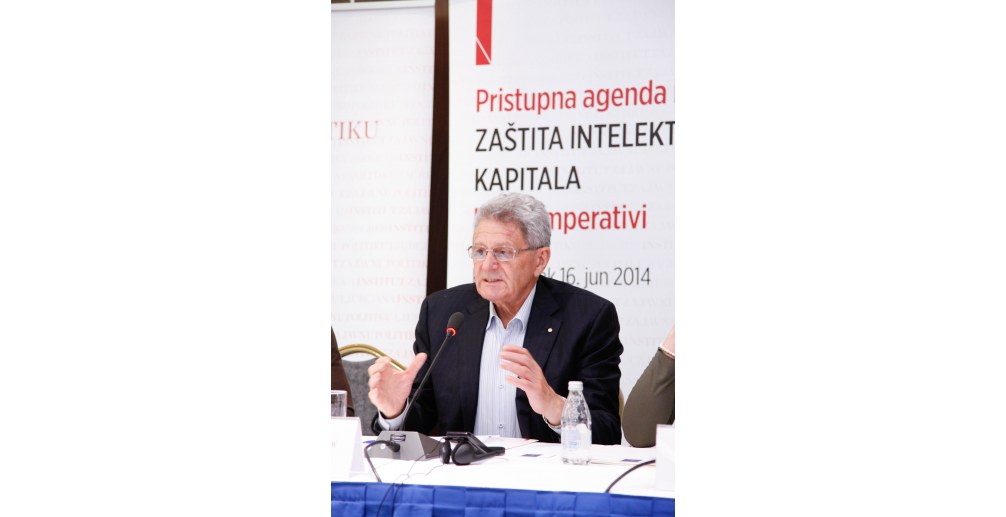
The question of intellectual property protection transcends the scope of a single chapter in the accession negotiations with the EU and permeates the entire process of the social development – it was asserted today at the opening of the panel discussion “EU Access agenda - Intellectual capital protection - Ethical imperatives”, which was organized by the Public Policy Institute.
Minister without portfolio in charge of EU Integration in the Government of Republic of Serbia, Ms. Jadranka Joksimović, has stated that, except for the law implementation as a general requirement of the accession negotiations, this area requires awareness raising in order to achieve a trifold effect: on the economy, the development of scientific-research activities and the position of consumers. According to Ms. Jadranka Joksimović, the state should demonstrate capability to incorporate this important matter in a broader context of public policies, which stands out as impediment to the process of negotiations, as well as to the process of social development and the state building as a fully functional system in all its segments. “We are at a stage where our economy is weak and fragile, but while saving economy, one can provide a development component to it by basing the economy on knowledge. The intellectual property is the driving force behind growth and competitiveness. It includes well-paid jobs, while the initiative and innovation lead to a greater number of job opportunities in the private sector”, Ms. Jadranka Joksimović pointed out.
Head of Negotiating Team for Accession of the Republic of Serbia to the EU, Ms. Tanja Miščević has asserted, while explaining the significance of the Chapter 7 in the negotiations with the EU, which is related to the questions of intellectual property, that the Chapter 7 is associated with many other chapters – those that regulate free transit of goods and workforce and creation of incentive business environment. “The framework of accessing the EU is the market, the inclusion into great common market of half a billion people strong, where there is room for all of us, whether we sell goods or intellectual services. Therefore, the question of the intellectual property rights is at the very core of negotiations for EU membership”, Ms. Tanja Miščević emphasized.
While pointing out the significance of the intellectual property as a segment of general development, Ms. Tanja Miščević stated that the awareness regarding the importance of intellectual property is present in Serbia, but still insufficiently regulated. “We have all heard about intellectual rights and its protection, and we all know they are violated. Let us use what lies ahead and create a clear and reliable system in this area that will protect all participants. EU offers clear examples about the means and models of achieving this.” Ms. Tanja Miščević concluded that one of the key measures of successful negotiations with the EU is reflected through the effective fight against piracy and forgery.
President of the Public Policy Institute Executive Board in Belgrade, Professor Mijat Damjanović, PhD, stated that Serbia is in epochal delay in many segments of its social life, including this field as well, which cannot be made up for in mere decades. That is why the efforts should be dedicated not only to legislation, but also to creating an ethical and moral basis for development. “When joining the EU one has to combine schools of law, as one is faced with new legal logic and consequences of the implementation of such legal system. We should not only observe narrow guild interests, but rather put the emphasis on the necessity of creating quality human resources”, Mr. Mijat Damjanović said.
When it comes to the practice and experience of the EU member states from the region, the panelists were Professor Vlastimir Matejić, PhD, the president of European movement in Serbia; Ms. Maja Bogataj-Jančič, PhD, director of the Slovenian Intellectual Property Office; Mr. Mitko Chatalbashev, regional director of CISAC (International Confederation of Societies of Authors and Composers) for Europe; Ms. Kristina Janušauskaite, PhD, legal expert of IFPI (International Federation of Phonographic Industry); and Mr. Boštjan Dermol, president of the Performing Artists' Assembly of IPF (Music licensing company for performers and producers of phonograms of Slovenia).
In regards to the existing legal framework in Serbia, the panelists were Ms. Branka Totić, director of the Intellectual Property Office of the Republic of Serbia; Mr. Aleksandar Kovačević, director of SOKOJ (Serbian Music Authors' Organization); Mr. Aleksandar Cvetković, director of PI (Organization for Collective Administration of Performers' Rights); and Mr. Rodoljub Stojanović, general secretary of UDS (Union of discographers of Serbia).
Ms. Branka Totić recalled the Serbia 2013 Progress Report, in which the European Commission advised caution to the latest changes of the Law on Copyright and Related Rights from 2012 that are not in compliance with EU legislation and international conventions, while also observing that the other laws from the field of intellectual property protection – Patent Law (2011), Trademark Law (2013), Law on Industrial Design (2009), Law on the Protection of Topographies of Semiconductors (2013) and the Law on Appellations of Origin and Geographical Indications of Goods (2010) – are mostly harmonized with the EU regulations.
It has been concluded that the amendments to the laws regulating the intellectual property protection are required, particularly in regard to the Law on Copyright and Related Rights. Moreover, the attention has been drawn to the necessity of efficient legal solution that can only be reached in cooperation with the representatives of right holders. Precisely, the professional associations should be involved in the process of preparation of the law, not only through participation in the public debate, but also as part of a Working Group composed of relevant state institutions.
All those whose rights have been violated, that is, writers, scientists, artists and all the representative organizations for realization of the rights of authors, interpreters, producers of phonograms and publishers, are united in a request for an urgent change of the legal framework and the active participation of the state in the fight against piracy and violations of intellectual property rights.
Source: Tanjug and Public Policy Institute

